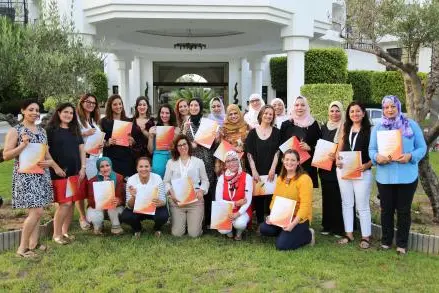PHOTO
Dubai, UAE: A select group of promising Arab women scientists from across the Middle East and North Africa (MENA) region have become the first fellows of the one-of-a-kind Arab Women Leaders in Agriculture (Awla) program.
The inaugural cohort includes 22 women scientists from Algeria, Egypt, Jordan, Lebanon, Morocco and Tunisia.
Funded by the Bill & Melinda Gates Foundation, the Islamic Development Bank (IsDB) and CGIAR Research Program on Wheat, Awla is a regional leadership and research development program led by the International Center for Biosaline Agriculture (ICBA).
Awla’s mission is to develop a cadre of aspiring Arab women researchers equipped with the knowledge and skills to make a positive difference in agricultural sustainability and food security in their countries specifically and the Arab region as a whole.
As part of the program, Awla fellows will set up the first research and development forum in the MENA region to address pressing regional agricultural challenges and take part in the region’s first networking platform for women researchers working across agricultural and food security-related disciplines.
The first edition of the program began with an eight-day workshop on 30 June 2019 in Tunis, Tunisia, involving mentoring orientation and positive leadership sessions. Team-based capstone projects are a critical element of the Awla fellowship, providing an opportunity for fellows to apply the skills, tools and knowledge they will gain during the 10-month program.
To encourage diversity and inclusion, teams comprise of fellows from different countries and backgrounds, enabling them to interact with each other and exchange their perspectives and experiences. At the end of the program, capstone projects will be presented and discussed with potential funders.
The 10-month program will be delivered in Tunisia and the UAE and include three face-to-face learning modules and 12 R&D online courses.
“Through this first workshop, I have started to find myself; I have started to find Hasna! Now I believe that every step, every second of my journey depends on me. I now see my goals; they are in my hands now. I am sure that through Awla, I will be able to achieve these goals,” says Dr. Hasna Ellouzi, one of the participants, who works as Assistant Researcher at the Center of Biotechnology of Borj Cedria (CBBC) in Tunisia.
Dr. Mouldi El Felah, Full Professor of Agronomy and Genetics from Tunisia, says: “Awla is a very important and innovative program. What I found during the workshop is that the approach is very clear and helpful for women fellows who will take on leadership roles in agriculture in the future. In this way, Awla works to address an important issue, namely the gender gap in the region.”
“The Awla fellowship is a huge opportunity for me to improve my skills and learn new tools to enhance my capability for leadership roles in the food and agriculture sector,” says Dr. Mounira Azouz, an Awla fellow from Algeria, who works as a food scientist at Algeria’s National Institute of Agricultural Research.
Awla aims to facilitate fellows’ access to leadership roles and promote research excellence and impact, encourage gender-responsive working cultures and enabling environments, and provide Arab women researchers with platforms to showcase their intellect, capability, and contribution.
The program contributes to the achievement of the United Nations Sustainable Development Goals on Gender Equality (SDG 5), Climate Action (SDG 13), Life on Land (SDG 15), and Partnerships for the Goals (SDG 17).
Awla’s long-term goal goes beyond capacity development and includes improved food security and nutrition, a better research and development landscape, and economic and social benefits of a narrowed gender gap in the region.
Press enquiries:
Mr. Showkat Nabi Rather, ICBA: s.rather@biosaline.org.ae, or +971 55 137 8653
About ICBA
The International Center for Biosaline Agriculture (ICBA) is a unique applied agricultural research center in the world with a focus on marginal areas where an estimated 1.7 billion people live. It identifies, tests and introduces resource-efficient, climate-smart crops and technologies that are best suited to different regions affected by salinity, water scarcity and drought. Through its work, ICBA helps to improve food security and livelihoods for some of the poorest rural communities around the world.
www.biosaline.org
© Press Release 2019Disclaimer: The contents of this press release was provided from an external third party provider. This website is not responsible for, and does not control, such external content. This content is provided on an “as is” and “as available” basis and has not been edited in any way. Neither this website nor our affiliates guarantee the accuracy of or endorse the views or opinions expressed in this press release.
The press release is provided for informational purposes only. The content does not provide tax, legal or investment advice or opinion regarding the suitability, value or profitability of any particular security, portfolio or investment strategy. Neither this website nor our affiliates shall be liable for any errors or inaccuracies in the content, or for any actions taken by you in reliance thereon. You expressly agree that your use of the information within this article is at your sole risk.
To the fullest extent permitted by applicable law, this website, its parent company, its subsidiaries, its affiliates and the respective shareholders, directors, officers, employees, agents, advertisers, content providers and licensors will not be liable (jointly or severally) to you for any direct, indirect, consequential, special, incidental, punitive or exemplary damages, including without limitation, lost profits, lost savings and lost revenues, whether in negligence, tort, contract or any other theory of liability, even if the parties have been advised of the possibility or could have foreseen any such damages.




















